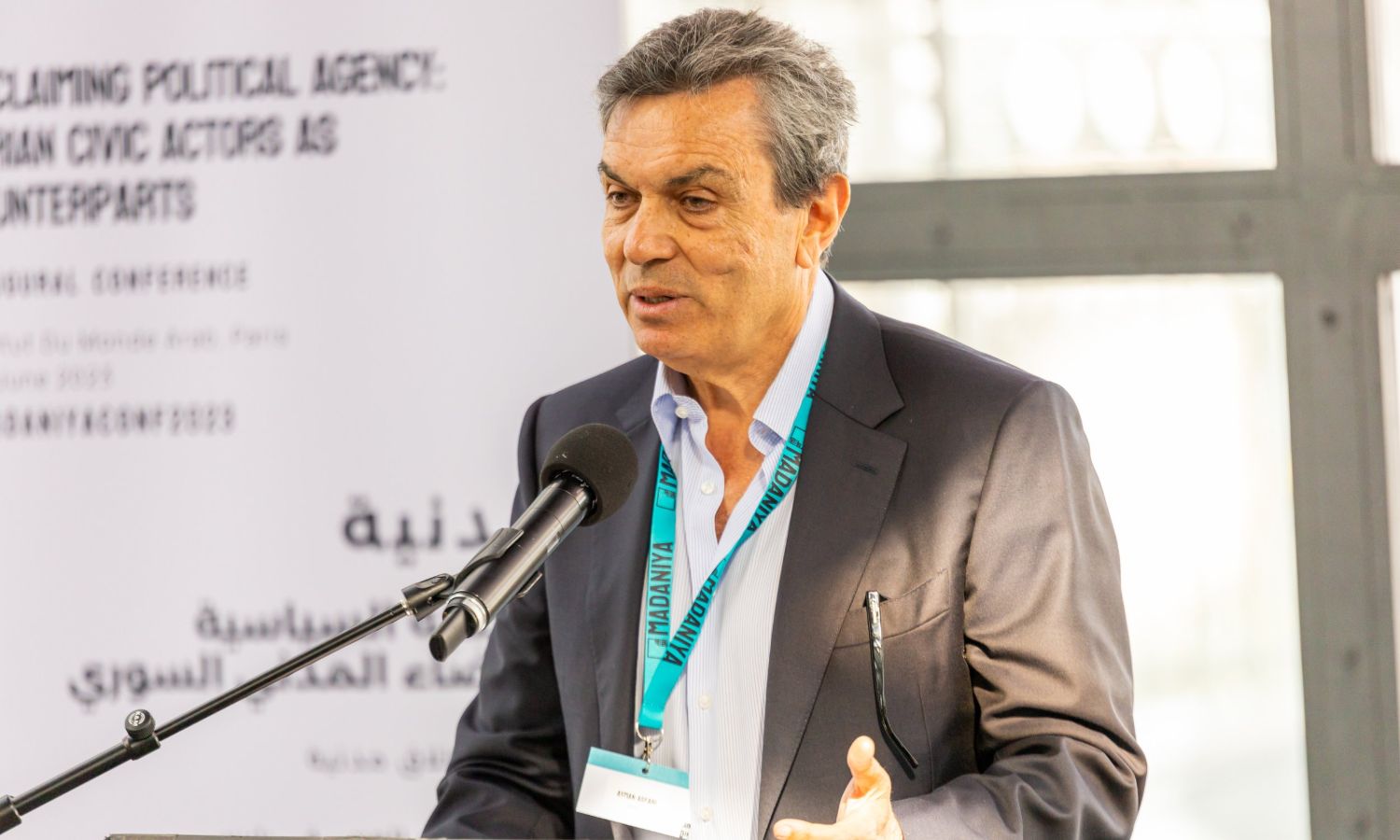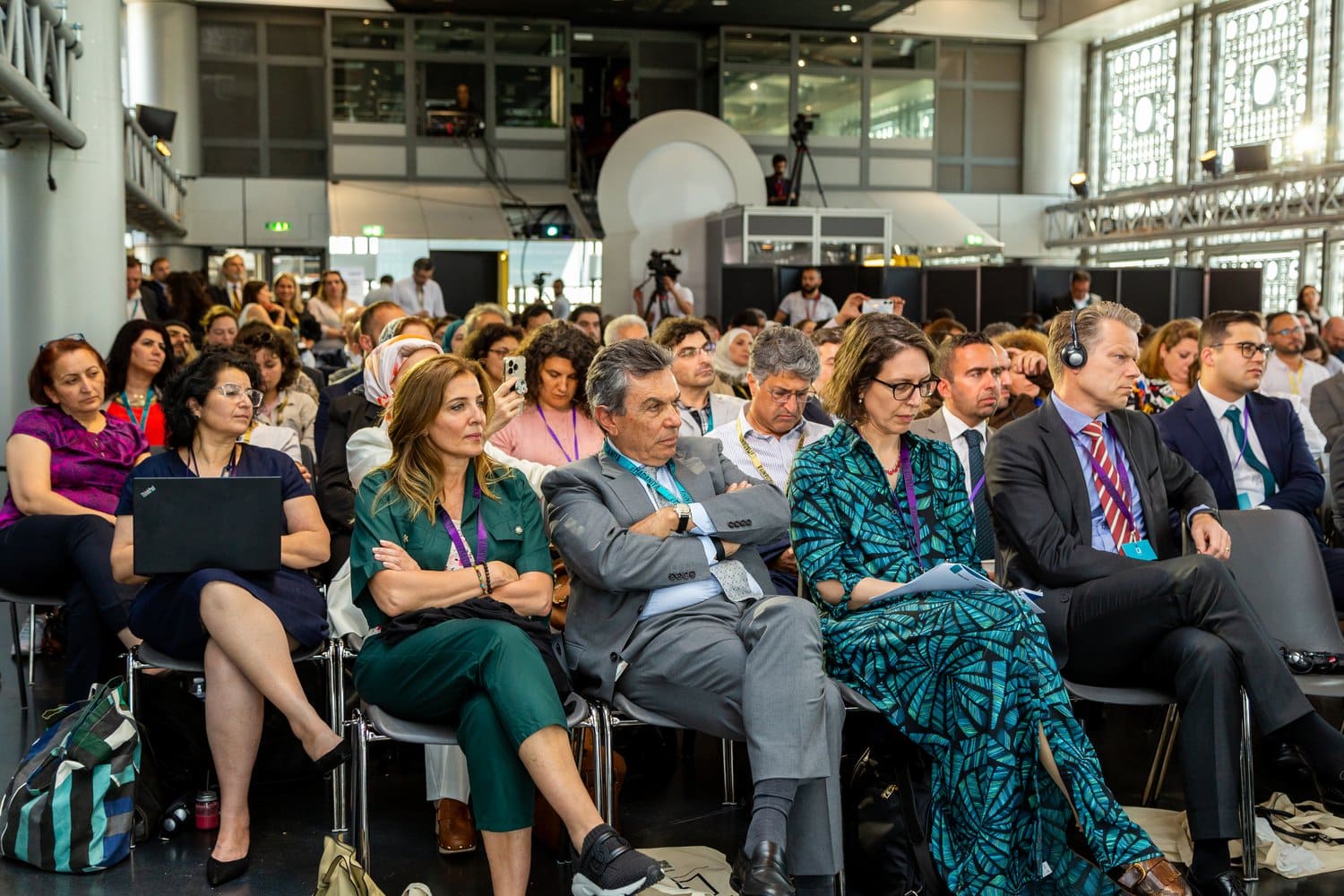



Syrian businessman Ayman Asfari returned to the media interface after launching the Madaniya initiative in the French capital, which aimed at enhancing the political agency of the Syrian civic space.
After an absence from the political scene for years, Asfari rose to prominence through the Madaniya initiative, which he launched at the Arab Institute in Paris between 5 and 6 of June.
Enab Baladi attended “MadaniyaConf2023”, which included 150 representatives of Syrian civil society organizations in various sectors.
Madaniya, whose board of directors is headed by the Syrian businessman, Ayman Asfari, defines itself as “a Syrian-led, Syrian-funded initiative, independent of political and foreign influence, aimed at enhancing the political agency of the Syrian civic space.”
Enab Baladi posed questions to Asfari to clarify the role of the Madaniya Network among the various Syrian civil society organizations, its plans, and the nature of mobilizing this number of organizations in one platform recently.
“MadaniyaConf2023” brought together more than 180 Syrian civil organizations under one roof at its launch conference. It is the largest gathering of Syrian civil society organizations and is comparable to the “Civil Society Support Room” (CSSR), which was announced by the former UN envoy to Syria, Staffan de Mistura. In Geneva in 2016, where it took it upon itself to follow the political process.
CSSR did not gain support from its members shortly after its establishment. In 2017, several Syrian organizations issued a statement announcing their apology for not accepting an official invitation to attend the meetings of the Civil Society Support Room.
At the time, the organizations indicated that they felt a growing lack of the required seriousness in dealing with the discussions and outputs of the CSSR.
In response to a question about the opportunity for Madaniya to emerge as a leading body for Syrian civil society and was he expecting the actors and the United Nations to support it, Asfari said, “(Madaniya) is an attempt to gather all civil actors and organizations under one umbrella to restore the political effectiveness of Syrian civil space, and how Syrians participate in decision-making in their country.”
He added, “(Madaniya) does not aim to represent member Syrian civil society organizations.”
“Instead, it strives to mobilize members within its umbrella based on shared values to elevate their presence and present them as true counterparts in decision-making processes related to Syria, making every effort to enhance their competence along the way.”
Regarding the party and the nature of support for Madaniya, Asfari replied that “Madaniya was established and will remain with purely Syrian leadership and funding, and therefore it is necessary that any support for Madaniya from countries active in the Syrian cause or the United Nations be based on the values of Syrian civil society.”
“This means that support should be characterized by a genuine commitment to the principles of human rights and democracy, with a focus on empowering local actors, facilitating their meaningful participation in shaping Syria’s future, and respecting the autonomy of Syrian civil society.”
Asfari added that “It is essential that the participation of external actors complement the voices and aspirations of local Syrian civil society institutions, rather than imposing agendas or undermining local ownership.”
Syrian civil society organizations are participating in several international events, the most recent of which was the VII Brussels Conference on ‘Supporting the future of Syria and the region” on the first day of the conference, which was attended by a large number of civil society organizations spread throughout Syria and neighboring countries, amid criticism of the themes of some of the sessions by the attendees, such as the choosing of “early recovery projects” as a title of a session that included a debate on the basic needs in Syria.

Syrian businessman Ayman Asfari, Chairman of the Board of Directors of the Madaniya Network, during the launching ceremony of the initiative in Paris – June 5, 2023 (MadaniyaConf2023)
It was raised in the media about Asfari’s attempt to enter the Syrian political equation through the Madaniya network after it was announced, which was denied by the Chairman of the Board of Directors of the Madaniya Network.
Asfari stressed that he does not aspire to any political ambition, and none of the initiative members aspire to establish a political party or take on the role of current political bodies within previous media interviews.
Asfari had previously refused any political role within the Syrian opposition in 2016 after he participated in the opposition conference in Riyadh in 2015, from which the opposition’s Negotiations Commission emerged so that his name was mentioned as one of the officials in the Syrian Opposition Coalition (SOC), especially after the resignation of its former president, Ahmad al-Jarba. He confirmed at the time, in an interview with the BBC, that he was not offered any position in the SOC and that if it was offered to him, he would refuse.
On the reasons for Asfari’s refusal to play any political role in Syria, despite his strong relations and his knowledge of the Syrian file from the beginning, he told Enab Baladi, “As a businessman, I refused to be involved in any political body, because this corresponds to my civil role and my confidence in the institutions of Syrian civil society.”
“Since the beginning, my endeavors have been of a purely civic nature, driven by my firm belief that Syrian civil society is the building block that will promote sustainable change in Syria.”
He added that realizing the pivotal role of the Syrian civil space made him dedicate his efforts to supporting and empowering the Syrian civil society, with a special focus on humanitarian initiatives.
Regarding his current role with Madaniya, Asfari said, “Currently, through Madaniya, we are striving to facilitate cooperation between various Syrian civil society organizations, which enhances our vision of a free and democratic future for Syria.”
After the start of the Syrian revolution in 2011, and because of his standing with the opposition, the regime tried to discredit Asfari by accusing him of “corruption” through loyal media and claiming in 2013 that he had obtained hundreds of millions of dollars in loans from Syrian banks, and fled with it, without providing any evidence.
The Syrian file has witnessed remarkable political activity since the catastrophe of the Feb.6 earthquake, represented by the normalization of some Arab countries’ relations with the Syrian regime and its return to the Arab League and the emergence of new initiatives such as “Madaniya.”
Also, the initiative of dissident Brig. Gen Manaf Tlass for a transitional period in Syria that includes collecting weapons and maintaining civil peace with the aim of reaching a political solution.
About his expectations for the next political stage in Syria, in light of the return of activity to the Syrian file, Asfari said, “At the present time, it is clear that the actions of the Syrian regime have hindered any meaningful political process. Moreover, we are witnessing disturbing trends of normalization, where the regime was not held accountable for not taking any fundamental measures that would authorize the start of the political process.”
Asfari stressed the importance of the “Madaniya” role and position in this context, in line with Security Council Resolution 2254 and “its vision to empower the free Syrian voice, which has consistently called for its demands to be met since the start of the Syrian revolution 12 years ago.”
Asfari clarified his relationship with the recently introduced initiatives, saying, “We do not coordinate or participate in any newly emerging initiatives. However, we very much hope that any future endeavors will prioritize the inclusion of diverse Syrian voices, support for human rights, and the pursuit of sustainable stability. Within (Madaniya), our sole focus remains on civil society and its organizations.”
He added, “Our goal is to integrate civil society into the political process and to confirm the ability of Syrian civil society to bridge the gap between politics and the people. While we may not have the authority to decide when to activate the political process, we at (Madaniya) network are working tirelessly to exercise an influential role in decision-making, ensuring that the actions of the various political and international entities flow into our vision.”
The Syrian businessman assured that any political process or solution without the Syrian civil society will create a vacuum, and it is the only one capable of filling this void.
“Civil society is the main bearer of the demands of the revolution and the free Syrian voice, and it will remain the bearer of these demands no matter what,” Asfari concluded.
if you think the article contain wrong information or you have additional details Send Correction